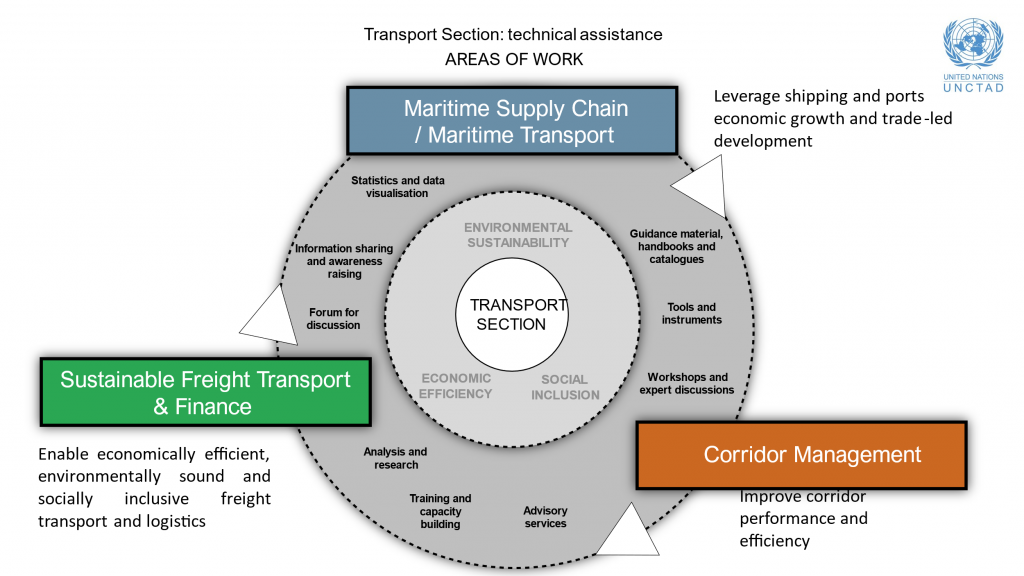United Nations Conference on Trade and Development
UNCTAD’s Transport and Trade Logistics Branch (TLB) within the Division on Technology and Logistics (DTL) partners with developing countries to address challenges and capitalize on opportunities in the areas of transport infrastructure, trade facilitation and logistics, related administrative, procedural and legal frameworks, and customs automation.
UNCTAD’s work in the field of transport and trade logistics includes:
- Research and analysis
- Dissemination of information on recent developments
- Providing advice to developing countries when formulating and implementing policies and programmes
- Assisting in the development and implementation of national legal frameworks in line with international legal instruments and standards, and providing support to developing countries in the context of multilateral negotiations
- Providing technical assistance in the field of transport and trade facilitation
- Supporting consensus building through intergovernmental Expert Meetings
- Providing technical assistance, training and advanced software solutions for modernisation of Customs Administrations’ clearance procedures and systems, in line with international standards and best practice
The Transport and Trade Logistics Branch is comprised of three sections: “Transport Infrastructure and Services“, “Transport Policy and Legislation“, and “Trade Faciliation“, as well as the Asycuda (Automated System for Customs Data) Programme.
Designed to be modular in nature to be tailored to changing circumstances and context, the Transport and Logistics Programme includes a Sub-Programme providing technical assistance in three specific areas, namely: Maritime Supply Chain, Sustainable Freight Transport and Finance, as well as Corridor Management. Special attention is dedicated to the special needs and requirements of small island developing states (SIDS), landlocked developing countries (LLDCs) and the least developed countries (LDCs).
The three specific areas:
- Efficient and Resilience Maritime Supply Chain: To support sound and robust maritime transport policy making, and decision that are based on evidence, deep and thorough analysis and good understanding of the maritime supply chain and logistics. Intervention action spans shipping, ship-port interfaces, port and yard areas and hinterland connections.
- Sustainable Freight Transport and Finance (SFTF): To support developing countries in their effort to promote economically efficient, environmentally sound, and socially inclusive freight transport and logistics systems.
- Corridor Management: To promote efficient transport corridors that enable improved market-access and value chain integration through tailored and adequate corridor management structures and institutional frameworks.
Click here to learn more about UNCTAD’s technical assistance.
Click here to learn more about UNCTAD related products and activities.

Transport Infrastructure and Services
Visit UNCTAD’s Transport Infrastructure and Services website here.
Transport infrastructure and services, including shipping, ports, roads and railways are essential for global merchandise trade and related supply chains.
In accordance with its mandate, UNCTAD is carrying out work to help developing countries improve their transport systems and ensure better access to worldwide markets.
In its intervention, UNCTAD is increasingly adopting a wider and multifaceted perspective that crosses modes and dimensions to better reflect the fast evolving trends that shape trade patterns and define the operating landscape of the transportation sector.
When undertaking research and analytical work, consensus building activities as well as technical assistance and capacity building initiatives, particular focus is put on building the regulatory and institutional capacities, developing and strengthening policies and promoting technical skills and expertise.
Key issues addressed and areas of intervention include:
- Freight transport economics with particular coverage of maritime transport, including trends and developments in inter alia, world merchandise trade, shipping, seaborne trade, port-related issues, transport costs, freight rates, as well as maritime transport connectivity and access
- Promoting efficient transport networks and transport corridor development
- Transport and logistics of the landlocked developing countries (LLDCs) and the small island developing states (SIDS), multimodal and transit transport
- Enabling sustainable freight transport systems, including through carbon emission reduction in freight transport, improved transport connectivity and transition towards energy efficient, clean, and environmentally friendly freight transport systems
- Financing sustainable freight transport systems
Select relevant outputs include:
- Review of Maritime Transport
- Technical reports on the transport and logistics of landlocked developing countries (LLDCs) and the small island developing states (SIDS)
- Consensus-building activities, including in particular Expert Meetings on Transport, Trade Logistics and Trade Facilitation on relevant themes such as LLDCs, transit transport, SIDS and Sustainable Freight Transport
- Technical assistance programmes and partnerships
- Advisory services as well as capacity-building and training activities
Contact the Transport Section: transport.section@unctad.org
